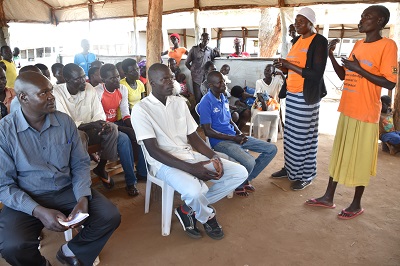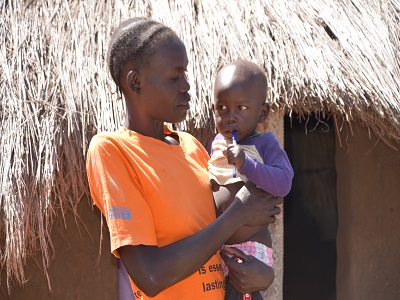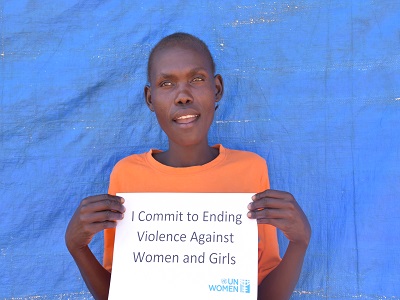From Where I Stand: 'Fighting sexual gender based violence is my calling'
Date:

Tabu carries out translation at a meeting in the settlement. Photo/ UN Women Uganda
After escaping the insurgency to Uganda, refugee women continue to experience different forms of violence including domestic violence and child marriage. This is due to extreme poverty in the settlement. As a way of escaping poverty, many refugee families secretly marry off their girls as young as 14 years.
Our culture doesn’t discourage early marriages. As long as a girl accepts to get married, no one intervenes. Although, Uganda has a law discouraging marriage before 18 years of age, in the settlement people don’t want to follow it. They marry off their young daughters secretly so that the public does get to know.
At the beginning of this year, my neighbor’s son aged 17, impregnated a 15- year-old, primary seven girl. The girl’s parents forced the boy to marry her. I intervened. Though the girl currently stays with the boy’s family, we agreed that when the baby makes six months, she will leave the baby at home to go back to school. The girl gave birth last month but I will have to follow up so that next year, first term, she joins Senior one. I want this girl to complete school.
Besides that, some women engage in risky behaviors such as offering sex for money in order to meet their basic needs. This exposes them to HIV infection and other sexually transmitted diseases.

UN WOMEN and its partners have been working in Yumbe since 2016, providing emergency psychosocial support to traumatised women and girls, often victims of gruesome violence in South Sudan. The project also responds to Violence Against Women and Girls (VAWG) by implementing activities on peacebuilding, psychosocial support and legal aid, established standards for Prevention of Sexual Exploitation and Abuse (PSEA). The project is funded by the Royal Embassy of Norway and UN CERF.
It is under the above project that together with other refugee leaders, I was selected and trained in monitoring and solving GBV cases in the community. I must know where sexual and gender based violence cases are or likely to happen. This helps me to intervene.
Every morning I go to the borehole to fetch water, that is where I get information about Sexual and Gender Based Violence (SGBV) in people’s homes. Such information is just a tip off for me to start following up cases. Some of women come to my home. Though, I prefer finding them in their homes so that we talk about the issue together with their husbands.
Sometimes when you counsel a woman alone, the husband may turn at you, thinking that you are misguiding the wife or backbiting him. But when you talk to them together, you come up with a joint solution. However, for some women who fear to share in the presence of their husbands, I encourage them to come to my house. Then I later meet them with their husbands. Some people are liars. You have to listen to both sides.
During, the interactive and sensitization meetings, my mobile phone number is shared. I receive calls from people whenever there is violence. During our trainings, we were only allowed to handle minor cases. If the case is beyond my level or that of the zonal leaders, I call UN Women for professional counselling. If the case involves assault or causing injuries, its reported to police.
Today, life is a bit fair. Just because of the work by UN Women and its partner TPO. At the beginning, life wasn’t easy at all. Though South Sudan was insecure, some of us thought of going back. But when UN Women started implementing its project here, our cases were assessed and put under different groups. We were later trained and counselled on managing trauma. That’s how we have managed to live here up to today.
My passion for SGBV monitoring is out the experience I went through. Together with my in-laws, we freed the war in South Sudan through the Morubu boarder. By then, I had a baby of two weeks. Before we left, my husband who remained in South Sudan handed me over to his father for care. But ever since we arrived at Bidi Bidi settlement, he has never stepped in my compound. For him to support you, you have to give him something in turn. At one time he said to me, “You are wise, capable and big enough. Find opportunities and take care of yourself”. Good enough, my neighbors have been so supportive. Whenever I go out to follow up on GBV cases, my neighbor takes care of my home and when she is away, I also take care of her home.
Before we left South Sudan, I used to do voluntary counselling with TPO. When I met them in Bidi Bidi settlement, it was a great opportunity for me to support them with monitoring Sexual and Gender Based Violence, mobilization and translation during their project implementation. We are only facilitated for the days we work. That’s how I have been able to look after my two biological children and two siblings. I usually counsel women in needy situation not to give out their bodies for money but to be patient, when peace returns to our land, we shall go back and live a normal life.
